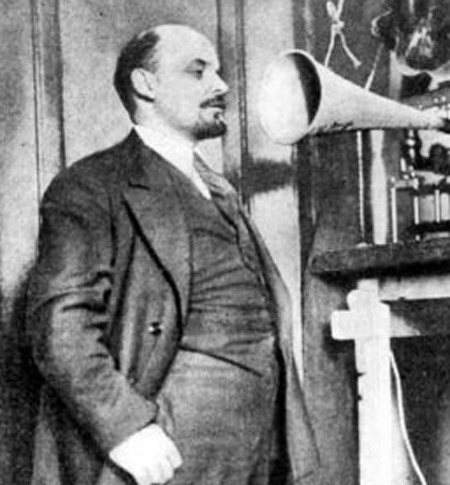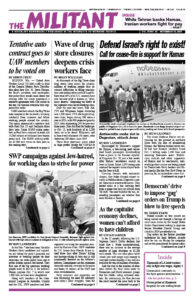
Since the Tehran-backed Islamist Hamas carried out its organized slaughter Oct. 7, killing over 1,400 Jews, many working people are thinking about why this attack was called a “pogrom.” And they’re seeking to learn more about the bloody history of Jew-hatred and its role under capitalism.
The Socialist Workers Party traces its revolutionary political continuity to the 1917 revolution in Russia and its leadership, the Bolshevik Party of V.I. Lenin. One key thread of that continuity is the relentless fight against antisemitism waged by the Bolsheviks.
Next week the Militant will run an article on the record of the Socialist Workers Party in fighting to arm the working class to take on the battle against Jew-hatred, a crucial question for making a socialist revolution in the U.S.
Pogrom is a Russian word, meaning the organized and bloody massacre of an ethnic group, in particular against the Jews.
Jews were increasingly driven from Western Europe amid the death agony of the feudal system as capitalist social relations became increasingly dominant. Millions fled to Eastern Europe and to Russia. Barred by czarist reaction from locating in the heart of Russia, the Russian rulers forced Jews to reside in what was called the Pale of Settlement beginning in the 1790s.
There they faced increasing explosions of Jew-hatred spurred by the czarist rulers. The term “pogrom” was first used during anti-Jewish rioting in the Ukrainian city of Odesa in 1821.
In the early 1900s, as workers and peasants in Russia were faced with extraordinarily harsh conditions under capitalism that would lead to the mighty 1905 revolution, hundreds of pogroms against Jews were organized by the czarist government and allied monarchist outfits.
During a “Passover pogrom” on Easter Sunday in 1903 in Kishinev, 49 Jews were killed, hundreds were wounded by gangs with knives and hatchets, an untold number of Jewish women were raped and 1,500 Jewish houses and shops were looted.
As part of these efforts, the czarist secret police forged a notorious book called the Protocols of the Learned Elders of Zion, used by murderous antisemites to today.
Bolsheviks fought Jew-hatred
“From their origins in 1903 as a politically distinct working-class current, the Bolsheviks had led the fight throughout the tsarist empire against pogroms and persecution of Jews,” writes Socialist Workers Party leader Dave Prince in his introduction to the Pathfinder book, The Jewish Question: A Marxist Interpretation by Abram Leon.
“Among Jews and other oppressed peoples across Russia and Eastern Europe, Lenin and the Bolsheviks were held in high regard for their uncompromising combat against anti-Semitic persecution.” They educated the toilers to see Jews as fellow victims of capitalist exploitation and oppression and allies in the fight to overthrow it.
This was a crucial plank in their successful fight to lead the workers and farmers to carry through a socialist revolution in 1917. “The new workers and peasants government in Soviet Russia established by the October 1917 Revolution not only ensured the political rights of Jews but also encouraged a Jewish cultural revival,” Prince explains.
“It did so during the devastation of a three-year-long counterrevolutionary war waged by Russia’s toppled landlords and capitalists, who joined forces with invading armies of fourteen imperialist powers — from London and Paris, to Tokyo and Washington,” said Prince.
The Bolsheviks continued to fight antisemitism in order to take that reactionary tool away from imperialism’s invading forces and their toppled Russian allies. In order to reach the broadest audience, the Bolsheviks set up a recording system to create records that were sent to the farthest corners of the country to be played for working people. Lenin recorded 16 of them.
One of the first was “On the pogrom persecution of Jews,” where he explained, “It is not the Jews who are the enemies of the working people. The enemies of the workers are the capitalists of all countries. …. The capitalists strive to sow and foment hatred between workers of different faiths, different nations and different races.” …
“Shame on accursed tsarism which tortured and persecuted the Jews. Disgrace and enmity to whoever sows enmity against Jews and hatred against other nations. Long live the fraternal trust and fighting alliance of the workers of all nations in the struggle to overthrow capital,” Lenin said.
“The Bolshevik-led government put an end to murderous pogroms against Jews,” Prince says. “The defeat of the counterrevolution and ending the pogroms at the same time was a momentous achievement of the toilers’ Red Army under Leon Trotsky’s command.”
The Bolsheviks led in incorporating the fight against Jew-hatred and pogroms into the program of the Communist International, founded in 1919 as a world movement of revolutionary parties determined to create in their countries what workers and peasants were striving to do in Russia.
After the Hamas pogrom Oct. 7, the Socialist Workers Party campaigned all across the country distributing a statement by Rachele Fruit, the SWP’s 2024 candidate for U.S. Senate from Florida.
“The Socialist Workers Party is part of the continuity in the fight against Jew-hatred that goes back to Lenin and the Bolshevik Revolution in Russia,” Fruit said. “Socialists should never support any crime against humanity in the name of revolution.”

